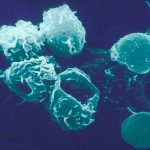Lien vers Pubmed [PMID] – 31246945
PLoS Biol. 2019 Jun;17(6):e3000335
The assessment of the regenerative capacity of the heart has been compromised by the lack of surface signatures to characterize cardiomyocytes (CMs). Here, combined multiparametric surface marker analysis with single-cell transcriptional profiling and in vivo transplantation identify the main mouse fetal cardiac populations and their progenitors (PRGs). We found that CMs at different stages of differentiation coexist during development. We identified a population of immature heat stable antigen (HSA)/ cluster of differentiation 24 (CD24)+ CMs that persists throughout life and that, unlike other CM subsets, actively proliferates up to 1 week of age and engrafts cardiac tissue upon transplantation. In the adult heart, a discrete population of HSA/CD24+ CMs appears as mononucleated cells that increase in frequency after infarction. Our work identified cell surface signatures that allow the prospective isolation of CMs at all developmental stages and the detection of a subset of immature CMs throughout life that, although at reduced frequencies, are poised for activation in response to ischemic stimuli. This work opens new perspectives in the understanding and treatment of heart pathologies.


